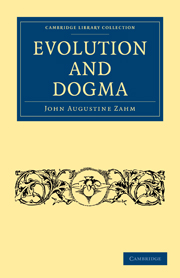Book contents
- Frontmatter
- PREFATORY NOTE
- Contents
- INTRODUCTION
- PART I EVOLUTION, PAST AND PRESENT
- PART II EVOLUTION AND DOGMA
- CHAPTER I MISCONCEPTIONS OF THEORY, ERRORS IN DOCTRINE AND MISTAKES IN TERMINOLOGY
- CHAPTER II MONISM AND EVOLUTION
- CHAPTER III AGNOSTICISM AND EVOLUTION
- CHAPTER IV THEISM AND EVOLUTION
- CHAPTER V THE ORIGIN AND NATURE OF LIFE
- CHAPTER VI THE SIMIAN ORIGIN OF MAN
- CHAPTER VII TELEOLOGY, OLD AND NEW
- CHAPTER VIII RETROSPECT, REFLECTIONS AND CONCLUSION
- AUTHORS AND WORKS CITED IN “EVOLUTION AND DOGMA.”
- GENERAL INDEX
CHAPTER VIII - RETROSPECT, REFLECTIONS AND CONCLUSION
Published online by Cambridge University Press: 29 August 2010
- Frontmatter
- PREFATORY NOTE
- Contents
- INTRODUCTION
- PART I EVOLUTION, PAST AND PRESENT
- PART II EVOLUTION AND DOGMA
- CHAPTER I MISCONCEPTIONS OF THEORY, ERRORS IN DOCTRINE AND MISTAKES IN TERMINOLOGY
- CHAPTER II MONISM AND EVOLUTION
- CHAPTER III AGNOSTICISM AND EVOLUTION
- CHAPTER IV THEISM AND EVOLUTION
- CHAPTER V THE ORIGIN AND NATURE OF LIFE
- CHAPTER VI THE SIMIAN ORIGIN OF MAN
- CHAPTER VII TELEOLOGY, OLD AND NEW
- CHAPTER VIII RETROSPECT, REFLECTIONS AND CONCLUSION
- AUTHORS AND WORKS CITED IN “EVOLUTION AND DOGMA.”
- GENERAL INDEX
Summary
Evolution Not a New Theory
WE may now, before concluding this protracted study, take a brief survey of the ground over which we have traveled and make a few reflections which are naturally suggested by the discussions which precede.
First of all, then, the evolutionary idea is not, as we have learned, the late development it is sometimes imagined to be. On the contrary, it is an idea that had its origin in the speculations of the earliest philosophers, and an idea which has been slowly developed by the studies and observations of twenty-five centuries of earnest seekers after truth.
In reading over the history of Greek philosophy, we are often surprised to see how the sages of old Hellas anticipated many of the views which are nowadays so frequently considered as the result of nineteenth century research. With limited means for penetrating the arcana of Nature, they frequently accomplished what we should deem impossible without the aid of microscope and telescope. They are often reproached with being simple, a priori reasoners, fanciful speculators and fortunate guessers at the truth; but they were far more than this. They did not, it is true, have at hand the wonderful instruments of precision which we now possess, but they had a keenness of perception and a faculty for getting at the heart of things, which probably have never been equaled and certainly never surpassed.
- Type
- Chapter
- Information
- Evolution and Dogma , pp. 378 - 438Publisher: Cambridge University PressPrint publication year: 2009First published in: 1896



